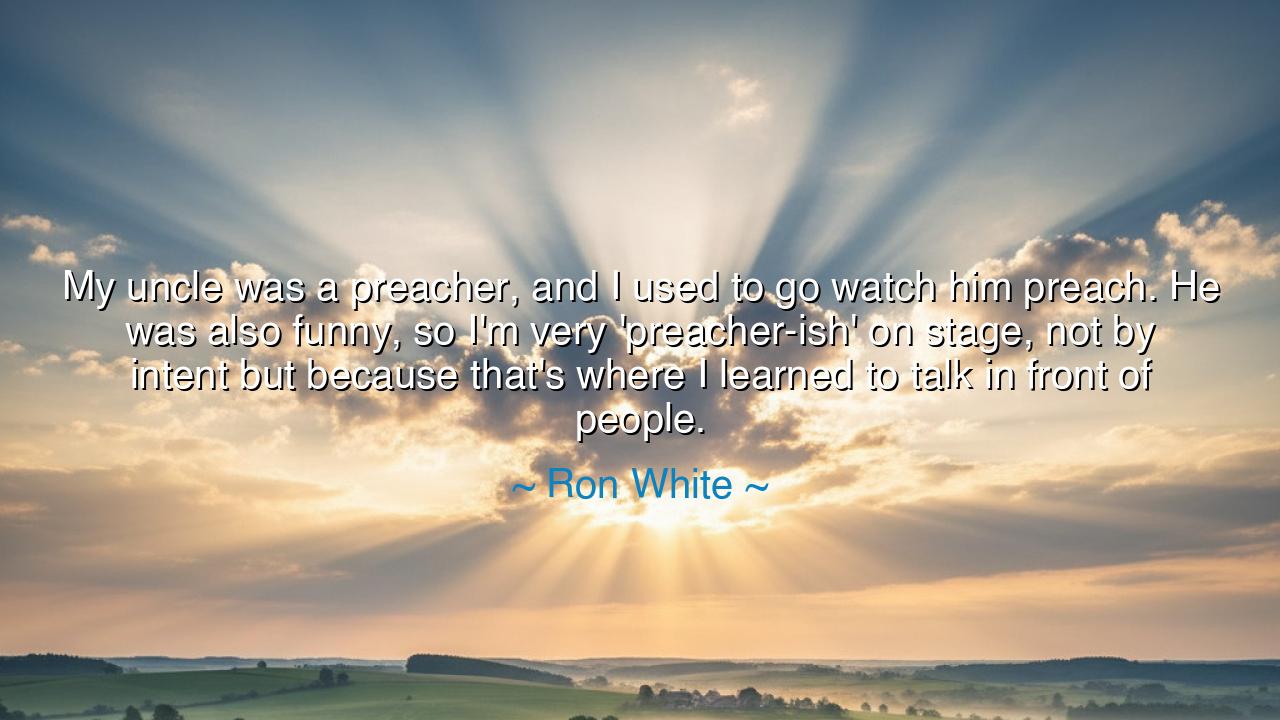
My uncle was a preacher, and I used to go watch him preach. He
My uncle was a preacher, and I used to go watch him preach. He was also funny, so I'm very 'preacher-ish' on stage, not by intent but because that's where I learned to talk in front of people.






“My uncle was a preacher, and I used to go watch him preach. He was also funny, so I'm very 'preacher-ish' on stage, not by intent but because that's where I learned to talk in front of people.” – Ron White
In these words, Ron White unveils a truth older than memory itself — that every voice carries the echo of those who came before. When he speaks of his uncle, the preacher, he is not merely recalling a family memory, but paying homage to a lineage of storytelling, of rhythm and fire, of words that move both heart and spirit. The pulpit, where sermons are born, and the stage, where laughter reigns, are not so far apart as they seem. Both demand the same sacred skill: the ability to touch souls through speech, to weave words into something greater than sound — something that awakens.
Ron White’s confession — that he is “preacher-ish on stage” — is an acknowledgment that artistry is inheritance. Though his intent was never to preach, his uncle’s spirit lives within him. The preacher, in truth, is a performer of the divine; he commands attention not through deceit, but through presence, through conviction. He does not merely speak — he delivers. When the young Ron watched his uncle preach, he learned not only how to talk, but how to hold a room, how to make silence a tool, and laughter a form of worship. Thus, the comedian and the preacher share a sacred kinship — one moves hearts toward heaven, the other frees them through laughter.
In the ancient world, the great orators understood this unity of humor and truth. Demosthenes, the Athenian statesman, trained his voice not only to persuade but to stir — for he knew that eloquence was power, and rhythm could shape the minds of men. Likewise, the prophets of old, from Elijah to Isaiah, spoke in poetry and parable, blending wit and wisdom. They knew that truth without beauty cannot pierce the heart, and beauty without truth cannot endure. Ron White’s “preacher-ish” style stands in this grand tradition — where performance becomes revelation, and speech becomes spirit.
It is also a reminder that influence often comes uninvited. The things that shape us most deeply are not always chosen — they are absorbed. A child watching a preacher does not know he is learning how to speak to a thousand faces; a listener laughing in a pew does not know he is learning the rhythm of joy. This is how wisdom passes from one generation to another, not through command but through example. The uncle’s voice, rising in faith, becomes the nephew’s voice, rising in comedy — and through both, the same human need is met: the need to feel connected, to feel seen, to feel alive.
Yet within this quote there is another truth: that the roots of greatness often lie in simplicity. Ron White did not learn from academies or from masters of rhetoric, but from the living example of one man speaking with heart. Too often we look to distant places for power, forgetting that the first and greatest teachers are found among our own — in family, in tradition, in the ordinary moments of youth that shape the soul forever. His uncle’s sermons were not lectures — they were lessons in humanity, lessons that taught the young Ron how to reach people, not just talk to them.
And so, let the listener understand: every craft is born of imitation before it becomes its own art. We are all apprentices in the workshop of life, shaped by those whose voices rang before ours. To learn to speak with fire, one must first listen to fire; to make others laugh, one must first feel the joy that laughter brings. Do not scorn the influence of your beginnings — they are your foundation. The soil from which you rise determines the strength of your voice.
Thus, the lesson of Ron White’s words is clear and shining: honor your origins, for they are your power. What you have learned unconsciously from those before you — the gestures, the tones, the courage to stand before others — is the inheritance of spirit. Whether your teacher was a preacher, a parent, or a poet, carry their voice with pride, but make it your own. Speak not to impress, but to awaken; laugh not to mock, but to heal. For the stage, like the pulpit, is holy ground when truth and joy dwell upon it. And in that sacred act of speaking — of reaching hearts with laughter or with light — we fulfill the eternal calling of every soul: to pass the flame onward.






AAdministratorAdministrator
Welcome, honored guests. Please leave a comment, we will respond soon